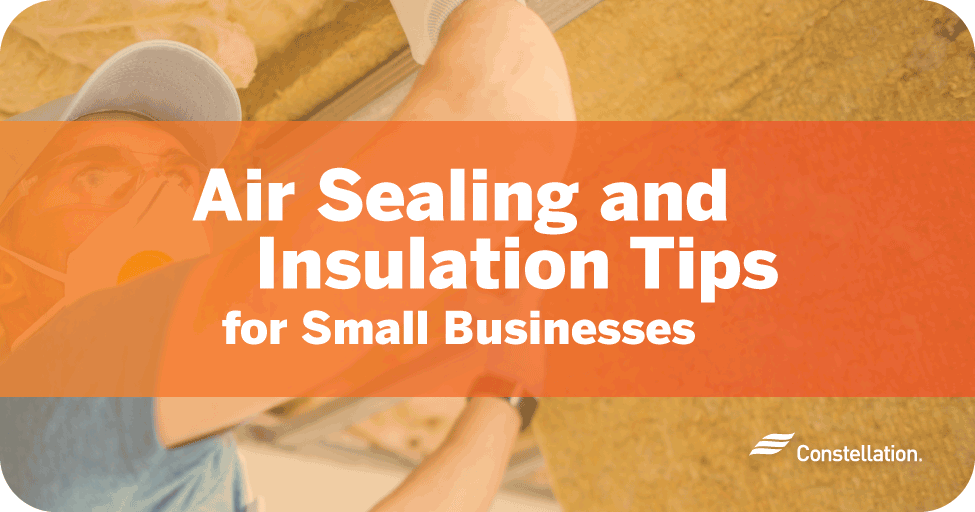Money may be flowing out your doors—and windows—if you don’t have adequate sealing and insulation in your workplace. Openings in walls and around windows and doors can waste energy and create uncomfortable work environments. Insulation for buildings reduces the air leaks that are one of the major sources of heating and cooling losses. Taking a moment to handle small business air sealing will improve the energy efficiency of your business and help eliminate waste from your energy budget.
Air leakage in office buildings
Your small business building can leak warm or cold air through small holes, cracks and gaps. Did you know that 4% of U.S. building energy use is wasted due to air leaks? Insulating buildings stops or reduces this waste. You will want to add ventilation to circulate warm or cool air, vent steam or cooking fumes, and to eliminate the health risks of stagnant air and humidity.
What is air sealing and is it worth it for your business?
You may wonder what air sealing is and whether it’s worth the effort. Among the many energy efficiency tips we have shared, sealing and insulating is one of the easiest and least expensive. You can do most air sealing techniques by yourself with weatherstripping, caulk, spray foam sealants and gaskets. You typically don’t need specialized skills.
The benefits of insulating small business building windows, doors and cracks are well worth the small expense, time and energy you spend on doing the work. Air sealing and insulation will:
- Save energy. When you keep cool or warm air inside, your HVAC doesn’t have to work as hard, using less energy.
- Improve air quality. The clean air, with balanced humidity, stays inside your workspaces, keeping dirt, soot, pollen and fumes out.
- Increase comfort. You can balance temperature and humidity better when you control air flow inside your business.
- Lead to less maintenance. Small business air sealing saves wear and tear on your HVAC and gives you better control of your environment, for a positive effect on electronics and other equipment.
- Stay within your budget. The Department of Energy estimates that you may be able to trim 15% of the money you spend on heating and cooling, with better sealing and insulation.
Air sealing tips for small business buildings
These small business air sealing tips will help improve your working environment, energy efficiency and expense profile.
Detect all air leaks in your work space
The most important of all air sealing techniques is finding the leaks in the first place. You might feel drafts from obvious sources and you may see holes, cracks and gaps around windows, doors, wiring, plumbing or in attics and basements. These are easy to find and fill.
It is often worthwhile to hire a professional to conduct a blower door test, which uses a powerful specialized fan and infrared cameras to find the less obvious leaks. You may bundle that test with a comprehensive energy audit to find air leaks, insulation issues and other areas where you can improve energy efficiency. Your utility company may offer a free energy audit.
Inspect your office ventilation and HVAC system
Small business air sealing is a great start. Take the extra step of making sure your workplace HVAC system is running efficiently. Replace filters and tape over air duct leaks. For more efficiency, you can insulate ducts and water pipes—especially those that go through unheated spaces.
If your HVAC is over 15 years old, newer models are so efficient that they may quickly pay for themselves in energy savings. Check ventilation throughout your space, so that bathroom, laundry and kitchen air blows out of your space to ensure humidity is also vented.
Seal drafty windows and doors
When insulating workplace buildings, doors and windows are a good place to start. Adding weatherstripping around a door can effectively close gaps. Be sure to use the right kind of weatherstripping that can withstand frequent opening and closing.
Other types of weatherstriping can fix drafty windows. For fixed panes, caulking is one of the tried and true air sealing techniques. Consider replacing inefficient single pane windows with newer, well-insulated, double-pane windows.
Check your business building’s insulation
A business energy audit may uncover small business sealing and insulation building deficiencies and areas that need attention. It can be tricky to check insulation where access is limited. Blow-in insulation is a good option for these areas.
Insulation does not last forever—it loses loft and breaks down over time. Insulate building areas with older insulation by adding new extra material where needed.
Create a comfortable work environment while improving energy efficiency
Small business air sealing and insulation is good for your business. You will operate with greater efficiency and boost productivity and well-being by keeping employees and customers comfortable, as well as contribute to a healthier environment.
When you’ve got your small business workplaces snug and free of drafts, take a look at your small business energy options to make sure you have the best energy plan for your needs. Constellation specializes in helping small businesses find the best energy plan for meeting their needs and fitting their budget.
